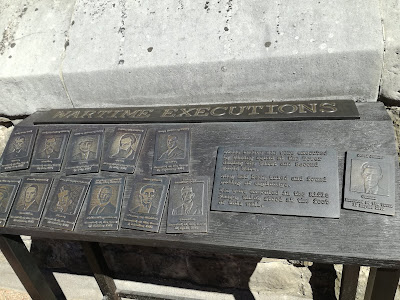London is a huge city to be explored. I was back on track the next day for touring the city. My Big bus ticket was valid for 48 hours and I boarded the vehicle from nearby Waterloo station. London has excellent connections with the suburbs. I wanted to see the historical sites of London that reflect Britain’s history. I decided to see the Tower of London.
Tower of London: The Tower of London can be approached by bus or metro. You have to get down at Tower-hill station to reach the tower. It is open for public viewing from 9 am to 5:30 pm on weekdays. Anyway if you reach with family, it’s better to buy a family ticket worth 75£. You may opt for an audio guide which will take you through the castle. According to the guide, the tower dates back one thousand years when the Normans entered the land. Thereafter the tower was regarded as a fortress, home for the Royals and also the infamous place where prisoners were executed for reasons of treason. You can opt for a walking tour or a group tour where the English speaking guide will dramatically take you through the chapters of history and familiarize with the castle.
Never miss the separate buildings like the white tower, the salt tower, the bloody tower and the crown jewel section. We explored through the stairs to see the bedchamber of Kind Edwards and then the armor. In fact, each and every room is equipped with writings which you can go through for better understanding.
We saw the salt tower which was said to be developed in 1230 and named after Julius Caeser. The modern tower is a modification and construction had occurred at various ages. We went through the history which reflected the brutal side of mankind; probably this is another side of the autocratic rule.
The white tower is the dome-shaped tower built by William the Conqueror. The building reflects Norman architecture. We saw the royal armor which was said to be used by Henry VII. It’s known as one of the strongest structure of medieval England.
The bloody tower is said to be the place where two minor brothers Edward V, 12 years and his brother 9 years old were kept imprisoned and later were murdered in a mysterious way. The guide took us through the stories of torture at the lower Wakefield tower.
During the 15th and 16th century AD, prisoners were taken through a series of torture with instruments that gave them unbearable pain. Manacles, rack and scavenger’s daughter were used as torture instruments.
Looks like there was a tradition of delivering unbearable pain before the prisoners gave up with the names of conspirators. A method very close to the modern day third-degree torture.
We saw the traitor’s gate, which had stories of treachery during the 12th century. We were taken around the place where Queen Anne along with other royals was executed.
We saw the Ravens at the tower. The guide told us that they are fed with meat and blood-soaked bird biscuits. There used to be a zoo during the Victorian age where royal beasts were displayed to the visitor.
The Ravens are the only animals present till day, and it’s believed that if the ravens leave then the kingdom will fall. Visitors are instructed not to feed the Ravens.
We moved towards the building where the crown jewels are kept secured. This is the most interesting place as the precious jewels, robes and crowns are preserved. We saw the Kohinoor or the 'mountain of light's. In fact, we were not allowed any photography as a security measure. The guide took us through a bit of history as the Kohinoor, that originates from India passed hands before it came to Queen Elizabeth.
 |
| The main purpose of the visit |
The Yeoman warder guards the chamber of the precious stones, which are displayed as the Queen’s glory. The property of the Queen are enjoyed by her but looked after by the British Government who pays for royal family’s expenses till date.
We managed to take a snap with the Yeoman Warder. In fact, there is a tradition of the key ceremony which is a 700 years old tradition still followed in London. We could get a nice view of the iconic tower bridge while we climbed the towers.
We took great pictures, shopped some souvenirs and then prepared to leave. Oh! the experience was like recapitulating history.



















No comments:
Post a Comment